| Listing 1 - 10 of 23 | << page >> |
Sort by
|

ISBN: 019515293X 0195179773 9780195152937 Year: 2002 Publisher: Oxford : Oxford university press,
Abstract | Keywords | Export | Availability | Bookmark
 Loading...
Loading...Choose an application
- Reference Manager
- EndNote
- RefWorks (Direct export to RefWorks)
Thomas Nagel is widely recognized as one of the top American philosophers working today. Reflecting the diversity of his many philosophical preoccupations, this volume is a collection of his most recent critical essays and reviews. The first section, Public and Private, focuses on the notion of privacy in the context of social and political issues, such as the impeachment of President Clinton. The second section, Right and Wrong, discusses moral, political and legal theory, and includes pieces on John Rawls, G.A. Cohen, and T.M. Scanlon, among others. The final section, Mind and Reality, features discussions of Richard Rorty, Donald Davidson, and the Sokal hoax, and closes with a substantial new essay on the mind-body problem. Written with characteristic rigor, these pieces reveal the intellectual passion underlying the incisive analysis for which Nagel is known.
Political philosophy. Social philosophy --- General ethics --- Theory of knowledge --- Equality. --- Ethics, Modern. --- Privacy. --- Philosophy of mind. --- Egalité (Sociologie) --- Morale moderne --- Vie privée --- Philosophie de l'esprit --- Rawls, John, --- Ethics, Modern --- Philosophy of mind --- Privacy --- Social psychology --- Secrecy --- Solitude --- Mind, Philosophy of --- Mind, Theory of --- Theory of mind --- Philosophy --- Cognitive science --- Metaphysics --- Philosophical anthropology --- Modern ethics --- Egalité (Sociologie) --- Vie privée
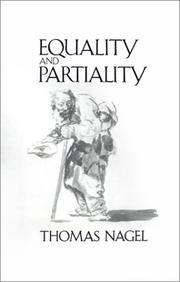
ISBN: 0195069676 0195098390 0199870055 0198023421 1280533463 9786610533466 1423758854 9780195069679 Year: 1991 Publisher: New York (N.Y.) : Oxford university press,
Abstract | Keywords | Export | Availability | Bookmark
 Loading...
Loading...Choose an application
- Reference Manager
- EndNote
- RefWorks (Direct export to RefWorks)
Political philosophy. Social philosophy --- Equality --- Justice --- Egalité (Sociologie) --- Equality. --- Injustice --- Conduct of life --- Law --- Common good --- Fairness --- Egalitarianism --- Inequality --- Social equality --- Social inequality --- Political science --- Sociology --- Democracy --- Liberty --- Justice. --- Egalité (Sociologie)
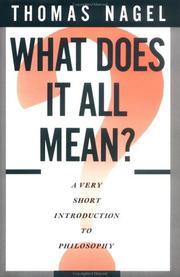
ISBN: 0195052161 0195052927 Year: 1987 Publisher: New York (N.Y.) : Oxford university press,
Abstract | Keywords | Export | Availability | Bookmark
 Loading...
Loading...Choose an application
- Reference Manager
- EndNote
- RefWorks (Direct export to RefWorks)
Philosophy --- Philosophie --- Introductions --- -Mental philosophy --- Humanities --- -Introductions --- Propaedeutics of philosophy
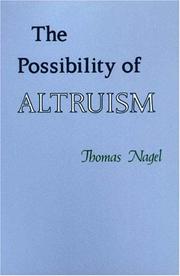
ISBN: 0691072310 9780691020020 9780691072319 0691020027 1400884497 0198243448 9780198243441 Year: 1970 Publisher: Princeton (N.J.): Princeton University Press,
Abstract | Keywords | Export | Availability | Bookmark
 Loading...
Loading...Choose an application
- Reference Manager
- EndNote
- RefWorks (Direct export to RefWorks)
Just as there are rational requirements on thought, there are rational requirements on action. This book defends a conception of ethics, and a related conception of human nature, according to which altruism is included among the basic rational requirements on desire and action.
Altruism. --- Altruisme --- 177.7 --- Menselijkheid. Opoffering. Erkentelijkheid. Medelijden --- Altruisme. --- 177.7 Menselijkheid. Opoffering. Erkentelijkheid. Medelijden --- #SBIB:17H10 --- #SBIB:17H20 --- Ethiek en moraalfilosofie: algemeen --- Sociale wijsbegeerte: algemeen --- #A9511W --- Sociology of culture --- Ethics. --- Morale --- Interpersonal relations. --- Altruism --- Ethics
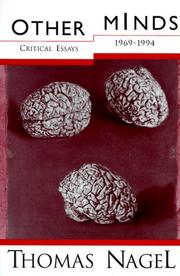
ISBN: 0195132467 Year: 1999 Publisher: New York (N.Y.) : Oxford university press,
Abstract | Keywords | Export | Availability | Bookmark
 Loading...
Loading...Choose an application
- Reference Manager
- EndNote
- RefWorks (Direct export to RefWorks)
Other Minds gathers Nagel's most important critical essays and reviews on the philosophy of mind, ethics, and political philosophy. The pieces here discuss philosophers from Aristotle to Wittgenstein, as well as contemporary legal and political theorists like Robert Nozick and Ronald Dworkin. Also included are essays tracing Nagel's ongoing participation in debates surrounding the mind-body problem - lucid, opinionated responses to Daniel Dennett, John Searle, and others. Running through Other Minds is Nagel's overriding conviction that the most compelling intellectual issues of our day - from the scientific foundations of Freudian theory to the vicissitudes of judicial interpretation - are essentially philosophical problems. Vital, accessible, and controversial, these writings represent the best of one of our leading thinkers.
Philosophy of mind --- Ethics --- Ethics, Modern --- Political science --- Philosophie de l'esprit --- Morale --- Science politique --- Philosophy --- Philosophie --- Philosophy of mind. --- Ethics. --- Philosophy.
Book
ISBN: 9780199919765 0199919763 9780199980369 0199980365 9780199977192 0199977194 9780199919758 0199919755 Year: 2012 Publisher: New York : Oxford University Press,
Abstract | Keywords | Export | Availability | Bookmark
 Loading...
Loading...Choose an application
- Reference Manager
- EndNote
- RefWorks (Direct export to RefWorks)
In Mind and Cosmos Thomas Nagel argues that the widely accepted world view of materialist naturalism is untenable. The mind-body problem cannot be confined to the relation between animal minds and animal bodies. If materialism cannot accommodate consciousness and other mind-related aspects of reality, then we must abandon a purely materialist understanding of nature in general, extending to biology, evolutionary theory, and cosmology. Since minds are features ofbiological systems that have developed through evolution, the standard materialist version of evolutionary biology is fundamentally incomplete. And the cosmological history that led to the origin of life and the coming into existence of the conditions for evolution cannot be a merely materialist history. An adequateconception of nature would have to explain the appearance in the universe of materially irreducible conscious minds, as such. No such explanation is available, and the physical sciences, including molecular biology, cannot be expected to provide one. The book explores these problems through a general treatment of the obstacles to reductionism, with more specific application to the phenomena of consciousness, cognition, and value. The conclusion is that physics cannot be the theory ofeverything.
Beginning --- Cosmogony --- Cosmology --- Creation --- Science --- Normal science --- Philosophy of science --- Biblical cosmogony --- Natural theology --- Teleology --- Biblical cosmology --- Creation windows --- Creationism --- Evolution --- Astronomy --- Deism --- Metaphysics --- Commencement --- Space and time --- Philosophy --- Darwin, Charles --- Darwin, Charles, Robert --- Cosmology. --- Cosmogony. --- Beginning. --- Creation. --- Philosophy. --- Darwin, Charles, --- Cosmogonie. --- Origine (philosophie) --- Critique et interprétation. --- Cosmologie --- Cosmogonie --- Commencement (Philosophie) --- Création --- Sciences --- Philosophie --- Philosophy of nature --- Science - Philosophy --- Darwin, Charles, - 1809-1882 --- Critique et interprétation.
Book
ISBN: 9781107604711 1107604710 9781107341050 1107341051 9781107414495 1107414490 1322521417 9781322521411 1107386926 1139893947 1107390656 1107395453 1107387736 9781107387737 Year: 2012 Publisher: Cambridge : Cambridge University Press,
Abstract | Keywords | Export | Availability | Bookmark
 Loading...
Loading...Choose an application
- Reference Manager
- EndNote
- RefWorks (Direct export to RefWorks)
Thomas Nagel's Mortal Questions explores some fundamental issues concerning the meaning, nature and value of human life. Questions about our attitudes to death, sexual behaviour, social inequality, war and political power are shown to lead to more obviously philosophical problems about personal identity, consciousness, freedom and value. This original and illuminating book aims at a form of understanding that is both theoretical and personal in its lively engagement with what are literally issues of life and death.
Life. --- Ethics. --- Vie --- Morale --- Deontology --- Ethics, Primitive --- Ethology --- Moral philosophy --- Morality --- Morals --- Philosophy, Moral --- Science, Moral --- Philosophy --- Values --- Life --- Arts and Humanities
Book
ISBN: 9780195394115 Year: 2010 Publisher: Oxford ; New York : Oxford University Press,
Abstract | Keywords | Export | Availability | Bookmark
 Loading...
Loading...Choose an application
- Reference Manager
- EndNote
- RefWorks (Direct export to RefWorks)
Philosophy. --- Religion. --- Justice. --- Philosophie --- Religion --- Justice --- Philosophy --- Religion, Primitive --- Atheism --- Irreligion --- Religions --- Theology --- Mental philosophy --- Humanities --- Injustice --- Conduct of life --- Law --- Common good --- Fairness
Book
ISBN: 9780199769926 Year: 1986 Publisher: New York, New York ; Oxford, [England] : Oxford University Press,
Abstract | Keywords | Export | Availability | Bookmark
 Loading...
Loading...Choose an application
- Reference Manager
- EndNote
- RefWorks (Direct export to RefWorks)
Much philosophical debate has attempted to reconcile the human capacity to view the world both objectively and subjectively. Thomas Nagel's ambitious and lively book tackles this fundamental issue, arguing that our divided nature is the root of a whole range of philosophical problems, touching, as it does, every aspect of human life. He deals with its manifestations in such fields of philosophy as the mind-body problem, personal identity, knowledge and scepticism, thought and reality, free will, and ethics.
Objectivity. --- Mind and body. --- Ethics.
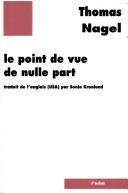
ISBN: 2905372842 9782905372840 Year: 1993 Publisher: Paris: Éditions de l'éclat,
Abstract | Keywords | Export | Availability | Bookmark
 Loading...
Loading...Choose an application
- Reference Manager
- EndNote
- RefWorks (Direct export to RefWorks)
"Ce livre parle d'un seul problème : comment combiner la perspective d'une personne particulière à l'intérieur du monde avec une vue objective de ce même monde susceptible d'inclure la personne et son point de vue. C'est un problème que rencontre tout être vivant qui possède la capacité et la tendance à transcender son point de vue particulier et à concevoir le monde comme un tout. Bien qu'il s'agisse d'un seul problème, il présente de nombreux aspects. La difficulté qu'il y a à réconcilier les deux points de vue survient tant dans la manière de mener sa vie que dans la pensée. C'est la question la plus fondamentale qui se pose au sujet de la moralité, de la connaissance, de la liberté, du moi et de la relation entre l'esprit et le monde physique. La réponse ou l'absence de réponse à cette question déterminera pour une grande part notre conception du monde et de nous-mêmes, ainsi que l'attitude que nous adopterons à l'égard de nos vies, de nos actions et de nos relations avec les autres. En faisant ressortir ce thème dans un certain nombre de problèmes philosophiques, j'espère proposer une manière de les regarder que d'autres que moi pourraient aussi trouver naturelle."
Objectivity --- Knowledge, Theory of --- Representation (Philosophy) --- Ethics --- Thought and thinking --- Philosophy of mind --- Self (Philosophy) --- Objectivité --- Théorie de la connaissance --- Représentation (Philosophie) --- Morale --- Pensée --- Philosophie de l'esprit --- Moi (Philosophie) --- Anthropologie philosophique --- --Anthropologie philosophique --- --Objectivity --- Objectivité --- Théorie de la connaissance --- Représentation (Philosophie) --- Pensée --- Objectivity. --- Mind and body. --- Life. --- Ethics.
| Listing 1 - 10 of 23 | << page >> |
Sort by
|

 Search
Search Feedback
Feedback About UniCat
About UniCat  Help
Help News
News